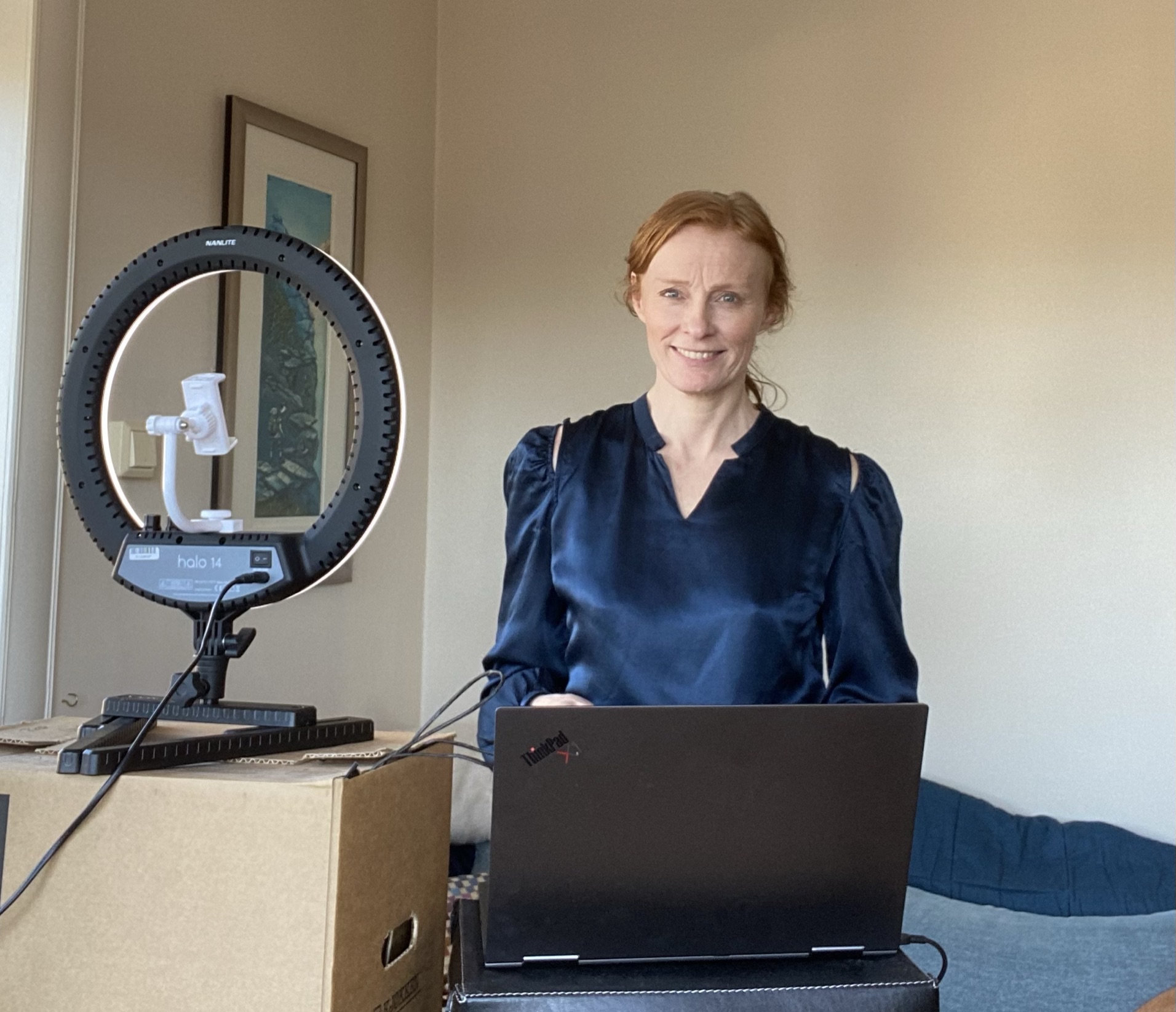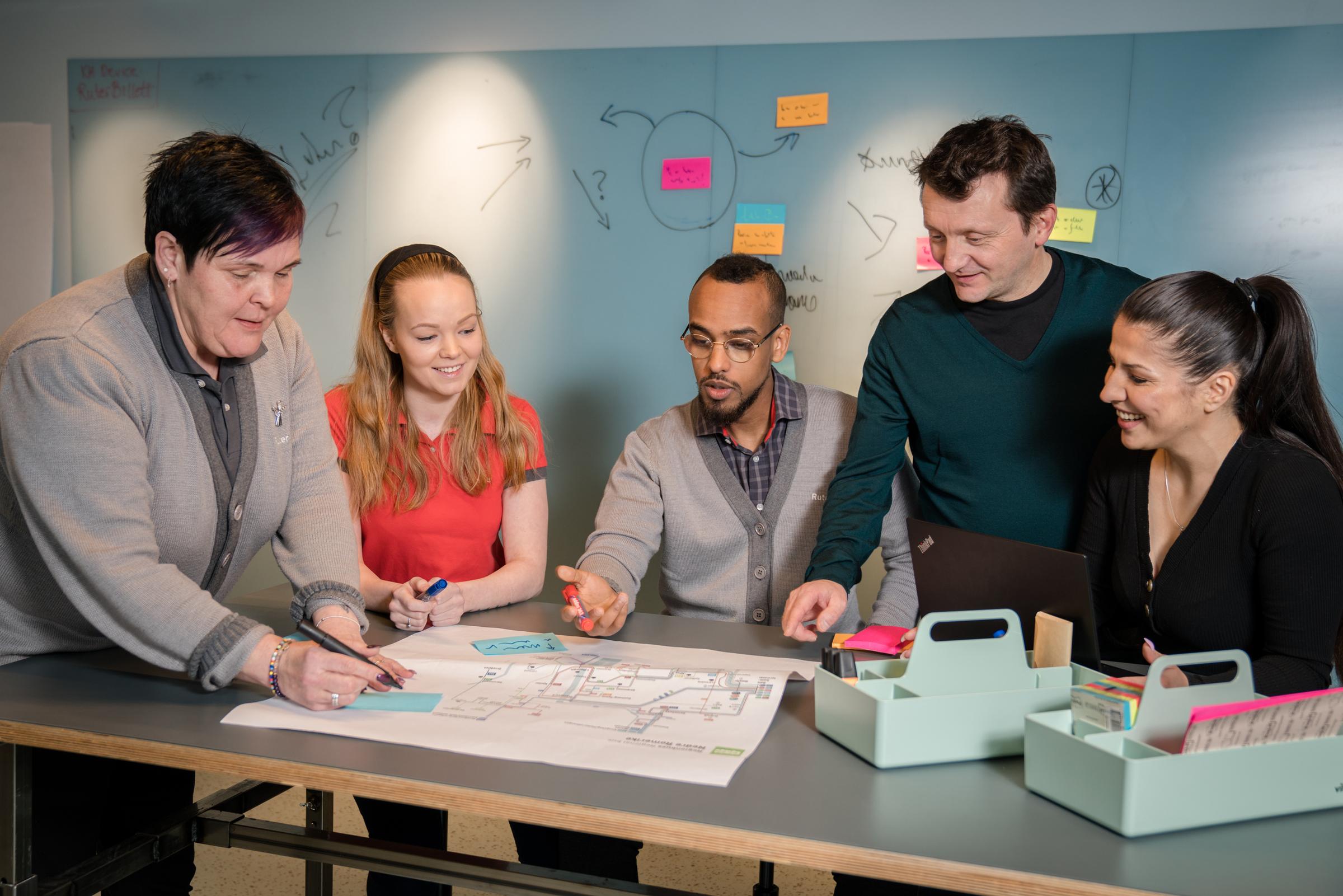
Ruter as employer
Ruter aims to be a desirable employer who is able to attract, retain and develop the skills we need to achieve Ruter’s goals. To do this, it is important that we offer a sustainable working environment as well as competitive and fair conditions.
Recruitment
An important factor for a sustainable and healthy working environment is awareness of gender equality and gender balance in the organisation. The Sustainable Freedom of Movement for All project has helped us focus even more on diversity and equality this year. In 2021, we ran several workshops at various levels in the organisation, including the People & Organisation unit, where proposals for follow-up into 2022 are on-going. No cases of discrimination were recorded in the organisation in 2021.
In our recruitment, we always strive to choose the best-qualified candidate – irrespective of gender. In job advertisements, we always encourage all qualified candidates – regardless of gender, ethnicity and background – to apply for the position. To ensure objectivity, we use ability and psychological tests in our selection process.
To ensure that we have access to the skills we need to achieve our goals, we depend on being an attractive employer. We closely follow the trends in the marketplace and work actively to stay up to date on the conditions we offer as well as management and skills development.
Wage policy
At Ruter, we work actively to ensure that we have a fair and performance-based pay policy in place. We work with a payroll company that helps us categorise positions and set the right salary for the right position. In 2021, we published guidelines for Ruter’s wage policy. The cooperation committee formulating the guidelines consisted of representatives from HR, the unions, managers and employees – who all helped to frame the expectations related to wages and wage development at Ruter. We have a wage system that is based on individual salary, skills, experience and performance.
We offer Ruter employees a wide range of responsibilities and complexities in their various roles. It is therefore difficult to make direct comparisons of the salary basis divided into different groups, such as gender, skills and experience. The size of the sample in the various groups does not provide statistically significant results. We know that we have a balanced wage level compared with the market. Statistics on salaries and salary development are generated by our HR system, and we have no discrepancies that cannot be explained based on salary criteria. This follows from our obligations on activities and reporting in the area of equality.
HSE and working with other authorities
53% of Ruter’s employees are organised in a trade union. Ruter has an excellent relationship with the unions through collaboration committees, working environment committees, dialogue, negotiations and recruitment. Conditions and guidelines for
contract staff and operators are taken care of through procurement processes and contract management.
Efforts are now being made to improve Ruter’s HSE system, which covers all employees. Safety inspections are planned for the first quarter of 2022. These were not been completed in 2021 due to many staff working from home, the pandemic and renovation of our office premises. HSE training for managers is also planned for January 2022. This was not completed in 2021 due to the pandemic and so many employees working from home.
Ruter has an agreement in place with Aktimed, a corporate health consultant. We arrange regular meetings with them and receive assistance as needed, e.g. related to attendance rates and special facilitation. Occupational health services are also represented on our working environment committees.
Hybrid working
For Ruter, 2021 was characterised by a new normal and hybrid working. Throughout the year, we discussed how to distinguish between work and leisure when working from home. We encouraged employees to take breaks outside and apply the calendar setting that ensures break slots between meetings. For employees in positions that did not require physical attendance, we offered a permanent agreement on working from home part-time. As part of this scheme, employees are allocated a sum of money to spend on their home workplace. A dedicated team of employees from the organisation was put together to create a forum for information exchange. The purpose of this dedicated team is to generate effective synergies across disciplines and roles in the organisation that affect the new normal and hybrid working. We reconfigured the building and made it more suitable as a collaborative office and acquired better equipment for hybrid meetings.

Ruter has 331 employees
- Of these 157 are women and 174 men.
- Of these 287 work in full-time positions. Of these 135 are women and 152 men.
- Of these 19 people are employed in temporary positions and 312 in permanent positions.
- Of employees in managerial positions, 27 are women and 22 men.
79% of employees in temporary positions are student employees. This provides extra capacity in technical areas – an initiative we take in order to connect to the student community and increase our visibility in this target group.
- 162 of the permanent employees are men and 150 are women. Of the temporary positions 7 are held by women and 12 by men.
- In order to promote development within the various subject areas, approx. 200 consultants were employed over the year, each with different contract terms and working hours. The reason for the use of consultants is the requirement for specialist expertise as well a need to cover peak periods.
- 55 women and 42 men have at some point in 2021 been on leave for one or more days.
All data are from the Ruter HR system which was rolled out in 2019.
In 2021, we recruited 56 people
Of these 39 are men and 17 women. Of these 25 are below the age of 30, 24 between 30 and 50 and 7 over 50.
In 2021, Ruter had a staff turnover of 7.36%
Of the 23 who left 14 were men and 9 women. Of the 23 who left 1 was below the age of 30, 17 between 30 and 50 and 5 over 50.
All data are from the Ruter HR system which was rolled out in 2019.

Leadership
Development of excellence in leadership is one of four main focus areas of our organisational development roadmap. The focus this year has been on process-based development at middle management level, where three parallel forums of department heads conducted 2 x 9 development sessions in the spring and autumn of 2021. This work will continue, based on insights gained from this year’s employee survey. These insights show that excellent leadership in combination with high levels of commitment constitutes the foundation for good organisational performance. The theme of leadership development is closely linked to the challenges faced by our managers and must be rooted in the performance development process. The composition of forums across units in the organisation contributes to building constructive interdisciplinary collaboration and understanding.
Skills development
Learning and development is the second focus area. An agreement on a modern learning platform was signed towards the end of the year and will support learning both internally at Ruter and with our operators on the basis of contracts. The pooling of training resources in the Department of Organisational Development has resulted in increased synergy and direction in our skills development work. Our employee survey shows that Ruter employees generally experience being offered excellent opportunities to apply their skills.
The employee survey also shows that we need to make visible and utilise internal job opportunities better as well as push career development. We aim to do this by building on the foundation of performance management where the assessment/development matrix shows that we have several suitable candidates with high potential who would be able to take on more complexity and responsibility. In the past three years, we have achieved excellent development internally where 30% of employees have been given more complex roles on one or more occasions. Our performance development process shown in the illustration includes annual employee interviews, additional progress interviews, succession planning and skills development (aimed at general and specific target groups such as managers and employees with high potential). The process is continuously documented in Mitt Ruter, our internal HR system.
Organisational culture and structure
Our organisational culture is being approached from many angles at Ruter. Information from our cultural mapping in 2020 and employee surveys conducted in November 2021 shows that we have excellent implementation abilities and willingness to change. These two indicators are closely linked to organisational performance. The greatest development has been seen in clarifying responsibilities, priorities and implementation of decisions as well as professional respect and experience sharing. The results also show that the work-related focus of our managers should be balanced by relational and strategic aspects as well as by a better way of conveying justifications for change. We work actively with cultural challenges related to hybrid working and at becoming better at ensuring a feeling of belonging, social interaction between colleagues and creativity and innovation.
Router employees are extremely proud of their job and find it very meaningful. This is an exceptional starting point for achieving our goals through strategic development work.

